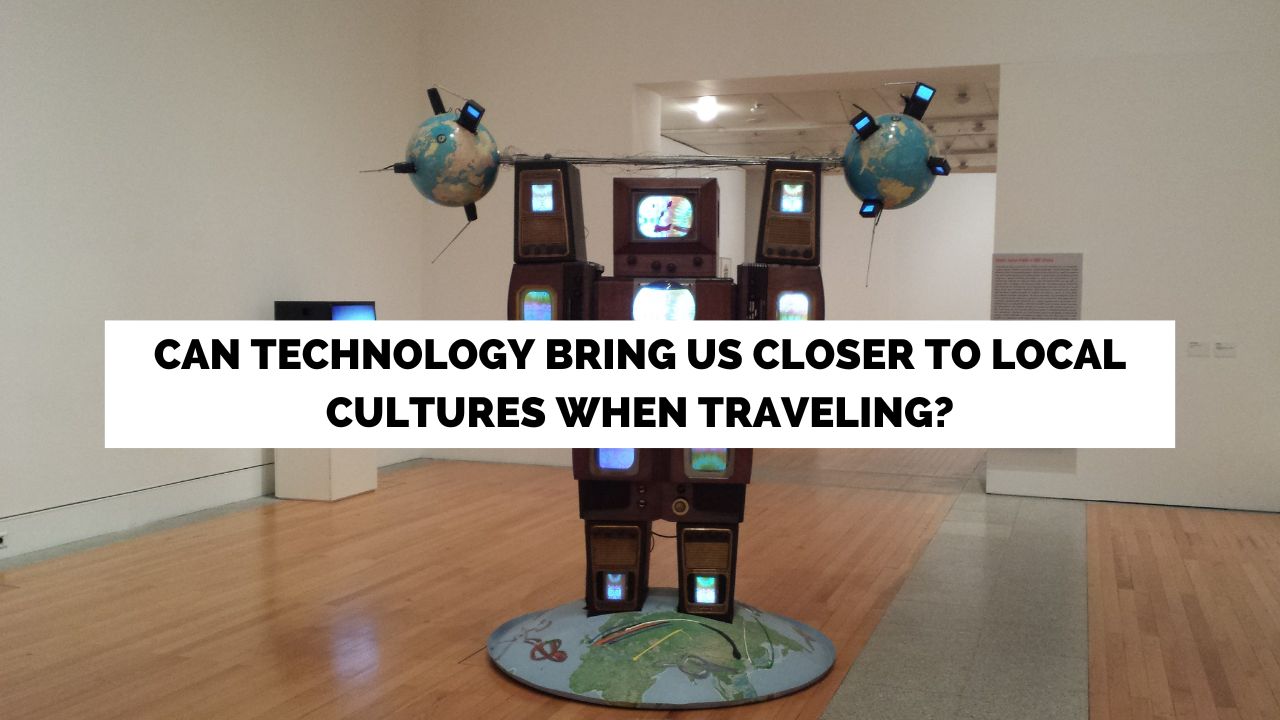How can advances in technology enhance our travel experience and bring us closer to local cultures? Let's take a look.

Are advances in technology all bad?
We're often told that technology is a barrier to truly experiencing local cultures. We're so obsessed with our devices that we miss out on the richness and depth of a new place when we travel. Yes, we get it – less time on Instagram and Tik Tok, more time enjoying what's going on around us!
But it doesn't have to be all negative. In fact, technology can actually connect us to local cultures when traveling in ways we never could imagine before.
With tools like language translation apps, virtual reality experiences, and social media platforms, we have new channels to learn about and engage with the world around us.
Advances in digital technology can also help us preserve traditional crafts, traditions and even dying languages. Far from ruining the travel experience, there's many ways it which it can be enhanced.
Ways to connect with local culture through technology:
Here are some ways that technology can enhance our travel experience and bring us closer to local cultures:
1. Language-learning and translation apps
Learning a few key phrases of the local language and respecting the local customs and etiquette can go a long way in making meaningful connections with locals. Language learning apps like Duolingo, Babbel, or Rosetta Stone can help us brush up on our language skills, allowing us to better communicate with the locals and understand their way of life.
While I've enjoyed half-sign language communication when I've met people who didn't speak my language, being able to have a conversation via a translation app would have been great in some circumstances. For example, when I cycled across Syria and got invited into the camp of some people living in the desert near Palymrya, a translation app would have been really useful to understand their stories and get to know them better.
2. Virtual reality experiences
Virtual reality technology can transport us to different time periods, allowing us to experience local cultures and traditions in a more immersive way than just reading about it in a guidebook. Many museums and cultural centers offer virtual reality experiences that allow visitors to step inside an ancient Greek temple or climb the steps of a Mayan pyramid.
In my current home town of Athens in Greece, there's some cool augmented reality tours of the Acropolis which bing the place more alive.

By allowing us to explore and engage with history, VR allows us to better understand and appreciate the local culture and traditions of a place. It can create a deeper connection and appreciation for the place we're visiting, and encourage us to engage more with the locals and their story.
3. Social media platforms
How can this help people get to know a culture better I hear you ask. Well, it depends how you use it. Finding local groups when traveling, or travel communities on Facebook can be a great way to connect with locals and get insider tips on where to go and what to see.
It can also be a way to arrange meet ups with locals and other travelers, allowing us to make new friends and learn more about the local culture. Additionally, social media platforms like Instagram and YouTube have opened up new opportunities for local artisans, entrepreneurs and creatives to showcase their work and share their stories with the world.
4. Online communities and cultural exchange site
There are also online communities and cultural exchange sites that connect travelers with locals who are willing to share their culture and traditions with visitors. Sites like CouchSurfing, EatWith, and WWOOF offer unique opportunities to connect with locals and learn about their way of life.
I really appreciate the Warmshowers site, which is a little like Couchsurfing but specifically for cyclists on a bike tour. I've met many wonderful people in the countries I have cycled through, and found out more over an evening meal with them about the local area and way of life than I would have done normally.
5. Online cultural classes and workshops
In the age of virtual learning, cultural classes and workshops have never been more accessible. Many organizations and business offer online classes on topics ranging from traditional dance, cooking, and crafts to language and history.
These classes not only allow us to learn new skills and knowledge but also connect us with local artisans and experts, providing an immersive connection to the local culture even from afar.
Using technology for more immersive travel experiences
While technology can certainly be a distraction when we travel, it can also be an asset. By embracing the various tools available, we can enhance our travel experience and develop a deeper connection with the local culture. Whether it's through language learning apps, virtual reality experiences, social media or online classes, technology can help us appreciate the local culture in a new way. So on your next trip, consider how technology can help you connect with the locals and immerse yourself in the culture of the place you're visiting. Because at the end of the day, travel is all about new experiences, perspectives and connections!
Travel Insights:
- Slow Tourism: A philosophy of travel that prioritizes deeper experiences and connections with local cultures and communities over superficial visits to main attractions. It involves taking a slower pace and savoring authentic experiences while respecting and supporting the local economy and environment.
- Why do people travel: People like to travel for many different reasons, such as to explore new places, experience new cultures, visit friends and family, try new foods, and have fun. Travel also provides opportunities to challenge oneself and learn new things, making it a rewarding and enriching experience.
- Pros and cons of traveling: The pros of traveling include broadening your horizons, seeing the world, and living life on your own terms. The cons of traveling include the cost (even if not too much), social isolation (especially in long term solo travel), losing touch with roots/loved ones back home in your own country, loneliness, and getting sick while on the road.
- Keeping travel memories alive: There are several ways to keep travel memories alive, including creating a travel journal, making a scrapbook or photo album, framing tickets and currency, and organizing your memories. Taking pictures and videos on your phone is also recommended.
 Article Author: Dave Briggs
Article Author: Dave Briggs